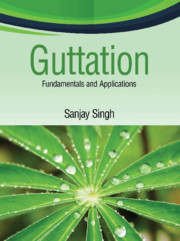Book contents
- Frontmatter
- Dedication
- Contents
- List of Figures
- List of Tables
- Foreword
- Preface
- Acknowledgments
- List of Abbreviations
- 1 Phenomenon of Guttation and Its Machinery
- 2 Principles of Guttation and Its Quantification
- 3 Mechanism of Guttation
- 4 Regulation of Guttation
- 5 Chemistry of Guttation
- 6 Plant Microbiology and Phytopathology of Guttation
- 7 Significance of Guttation in Soil–Plant–Animal–Environment Systems
- 8 Significance of Guttation, Associated Structures, and Root Secretion in the Production of Pharmaceuticals and Other Commercial Products
- 9 General Conclusions and Future Perspectives
- Appendices
- Bibliography
- Index
7 - Significance of Guttation in Soil–Plant–Animal–Environment Systems
Published online by Cambridge University Press: 12 May 2020
- Frontmatter
- Dedication
- Contents
- List of Figures
- List of Tables
- Foreword
- Preface
- Acknowledgments
- List of Abbreviations
- 1 Phenomenon of Guttation and Its Machinery
- 2 Principles of Guttation and Its Quantification
- 3 Mechanism of Guttation
- 4 Regulation of Guttation
- 5 Chemistry of Guttation
- 6 Plant Microbiology and Phytopathology of Guttation
- 7 Significance of Guttation in Soil–Plant–Animal–Environment Systems
- 8 Significance of Guttation, Associated Structures, and Root Secretion in the Production of Pharmaceuticals and Other Commercial Products
- 9 General Conclusions and Future Perspectives
- Appendices
- Bibliography
- Index
Summary
Introduction
It should be clear from the descriptions in previous chapters, and especially in the light of recent findings and fresh discoveries made in this field, that the previously viewed and believed facts about guttation not being beneficial for plants and people have been disputed, and readers will now fully realize that the guttation process and phenomenon have a range of functions that could be of basic, as well as, applied significance for both plants and people (Singh 2013, 2014a,b, 2016a,b; Singh and Singh 2013). In fact, from the evolution point of view, it is a fundamental process that provides plants with ways to dispose solutes, improve nutrient acquisition, and maintain water balance for proper growth and development. Particular secretory organs like nectaries, hydathodes, and trichomes use combined secretory and retrieval mechanisms that are not properly understood currently. In leaves, fluid excretion, that is, guttation, serves varied purposes and is mediated by hydathodes, that is, mouths without lips. The importance of guttation for plants can be identified by the fact that it might serve as a pressure-release valve in precipitation and continuous absorption of water, with resultant progressive development of hydrostatic pressure that pumps water up in the leaves (Eaton 1941). Further, guttation fluid also provides opportunities for noninvasive measurements and organic and inorganic chemical quantification, which includes proteins, enzymes, nutrients, vitamins, and hormones needed for proper growth of plant and soil health (Singh 2014a,b; Singh and Singh 2013). Its functions and significance in soil–plant–animal–environment systems and the related physiological research findings are presented in this chapter. Readers might, at first instance, observe some brief repetitions at places, though in an altered form, of a few issues demonstrated in the below-mentioned sections, but the details given serially thereof were considered important in the wake of unjustified long-neglected identification of guttation as a vital physiological phenomenon in plant science.
Soil-related implications of guttation
Impact of guttation on soil fertility and soil productivity
The chemicals in guttation water provide opportunity for noninvasive tests to determine the nutritional status of soil and plants (Curtis 1943, 1944a,b; Ivanoff 1963), and in this context, some interesting observations were made on the impact of guttation water on soil fertility. Guttation water is understood to exert governance over the solubility of organic and inorganic nutrients and polymerization of organic compounds, which aid and add to soil fertility (Magwa et al. 1993).
- Type
- Chapter
- Information
- GuttationFundamentals and Applications, pp. 106 - 124Publisher: Cambridge University PressPrint publication year: 2020



